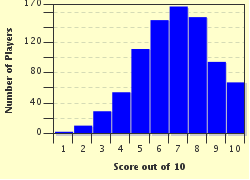Quiz Answer Key and Fun Facts
1. 1066 is remembered for the death of Harold II in the Battle of Hastings. However, Harold had success earlier in the same year by defeating the Vikings in which battle?
2. Which of these men became Archbishop of Canterbury in 1162?
3. 1272 saw the accession of Edward I, who succeeded which of these Kings?
4. The Peasants' Revolt of 1381 was led by which man?
5. In 1476, William Caxton was the first man to do what?
6. During the reign of Henry VIII, in the 16th century, many well known people met their deaths by being beheaded. Which of these avoided this fate by dying of natural causes?
7. 1658 saw the death of which of these leaders?
8. The 18th century brought in the Industrial Revolution and many new inventions. Which of these men was responsible for the 'Spinning Mule'?
9. Britain was at its military height during the 19th century. Which of these battles did NOT take place in the 1800s?
10. 1981 saw the founding of a new political party in the UK. Which of these was it?
Source: Author
rossian
This quiz was reviewed by FunTrivia editor
bloomsby before going online.
Any errors found in FunTrivia content are routinely corrected through our feedback system.

